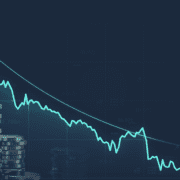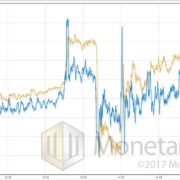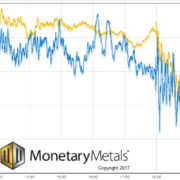The Economy is in Liquidation Mode
If you’re an American over a certain age, you remember roller skating rinks (I have no idea if it caught on in other countries). This industry boomed in the 1970’s disco era. However, by the mid 1980’s, the fad was fading. Imagine running a rink company at the end of the craze. You know it is not going to survive for long. How do you operate your business?
You milk it.
You spend nothing on capital improvements, slash maintenance, and reduce operating expenses. There’s no return on investment, so you cut to the bone and wring out as much cash as possible. When a business has no future, you operate in liquidation mode.
Your rink generates cash flow, but this is no profit. It’s simply the conversion of accumulated capital into present income. You are consuming capital, almost literally eating the business.
I have used a family farm as an example to paint a clear picture of capital consumption. Imagine using your farm, not to grow food, but to swap for it. You tear down the barn to sell the oak beams for flooring, auction off the back 40 (acres), put the tractor on Craigslist, then finally sell the farm and house. All to buy the produce you can no longer harvest.
Let this sink in. The farm’s falling crop yield can’t feed you any longer, but you still need to eat. You’re liquidating the farm merely to buy groceries.
The conventional view encourages you to be grateful that the purchasing power of the farm is high, that it trades for a big stash of food. While it may be true that you can eat for years on the proceeds, it’s small consolation for the loss of what had been an evergreen income.
Roller skating was just a minor entertainment trend. Only rink owners were harmed when it ended. By contrast, we would all be in big trouble if the same phenomenon happened to farming. And unfortunately it did. Not to farms—but across the whole economy, a decent return on capital is disappearing. Interest has gone the way of big hair and disco music.
Businesses borrow to expand production. The additional production increases profits. A portion of this profit is what pays interest. The problem is that fewer and fewer businesses can find decent opportunities to expand. If they could, they would be borrowing aggressively at today’s dirt-cheap interest rate. Their borrowing would push interest up. They’re not, and the proof is the fact that interest has been falling for three-decades.
The Federal Reserve is now pumping mass quantities of credit into the market, while productive demand for credit is lethargic. Borrowing—much of it for financial purposes such as share buybacks and acquisitions—now depends on the Fed and its artificially low administered interest rate.
The Fed operates on the theory that lowering interest stimulates the economy, at the cost of causing prices to rise. This is dubious, at best. However, so long as purchasing power holds steady, the Fed feels it has latitude to keep doing it. In its vain attempt to stimulate the economy, the Fed is actually suffocating it.
For centuries, people living in Western Civilization have been accumulating capital. They have not simply subsisted, and left the world the same as when they entered it. They have been creating more than they consume, passing on new wealth to their children.
The Fed’s falling interest rate has slammed this process into reverse. It has put the entire economy into liquidation mode. It has forced people to consume their capital.
This article is from Keith Weiner’s weekly column, called The Gold Standard, at the Swiss National Bank and Swiss Franc Blog SNBCHF.com.








In the Liquidation Mode piece you described a business which has a declining market as an example of why a business goes into liquidation mode. This makes perfect sense. At the end of the article you claim that the low interest rates fostered by the Fed has forced the Economy as a whole into liquidation mode. That seems a bit of a stretch to me. It makes sense if you consider a person living on their savings, as you have in past articles. But, for the rest of the economy I don’t see this being a good analogy. Many businesses are, as you noted, not expanding and therefore not borrowing. That itself is a downward pressure on interest rates that are responding to market forces as some rates still are.
So, there is an issue of cause and effect and effect to be sorted out here. I think this is a bit more complex than your closing statement makes it seem.
Do we not have a demographic shift in progress? Lots of Baby Boomers entering their retirement years selling large homes and moving into downtown condos or smaller homes in low cost-of-living regions. Those people are now buying fewer cars, going out less often, generally downsizing their spending habits. This alone I think could explain much of the declining demand for borrowing and keep downward pressure on interest rates for some years to come. If consumers on average consume less, a consumer-centric economy will contract regardless of what policies the Fed may choose to implement. The Fed can still make things worse of course, but it can’t be blamed for the demographics.
mycophile,
I’m not sure if I buy completely into Harry Dent’s theory that demographics explains all of the moves in the economy.
46 years in the past [I think that is his offset for a spending wave] is something like it was 46 years earlier. That 46 years was even more like the previous 46 years .. etc. The current time does not resemble the most recent 46 years nearly as much.
Modern society depends on technology much more than at any time in the past. Technology is not only advancing but getting cheaper at the same time. Other than basic needs, consumption is becoming more digital and less physical.
Less demand for physical items means less consumption and less jobs for humans. Less jobs for humans in turn, creates less disposable income, hence even less demand.
Here is an example: In the near future, most cars will drive themselves. Why buy a car when you just buy a ride; like a public transit system? One car serving ten people or more is certainly much cheaper than ten individual cars.
In answer to your conclusion that the Fed can’t be blamed for demographics, I agree. They don’t even factor it in. I can blame the Fed and the government for a blatant waste of resources and claiming to have all of the answers when they are clueless.
elegantly succinct. However, is it accurate to sum up by referring to “the fed’s falling interest rate”? isn’t it more accurate to say that a falling interest rate leading to a crack-up-boom is inevitable when a monetary indirect exchange division of labor economy embraces an irredeemable (read, legislated) currency monopoly? this is ultimately a matter of civics. different classes of people having different rules of law inerrantly and automatically means exploitation. exploitation is unequal (vastly unequal, read, legislated) results accruing to different people for the same amount of effort or work. exploitation continues until the crack-up-boom. all the psychology and perception and all the insane things people are capable of along the way is really just of tangential interest (no pun intended).
as if a few political shakeups mean anything. the foundations of our (read, western, really global) society are laid on sand. is it the fed’s fault? they don’t have any choice, they could not behave any other way. reality cannot be contravened. and it has not been. all the money (read, gold) is still out there serving its purpose right now. it’s just not a civic-legal purpose at this time. much to society’s lament. it’s a fight for survival now. law of the jungle.
Thanks for your comments.
mycophile: Agreed, it’s a lot more complex. My challenge, in this column, is to take a slice of a bigger picture, and present it clearly in 600 words.
jham: I am not sure I’d say that interest collapsing to zero is inevitable. The opposite is also possible–interest skyrocking to infinity. That almost happened in the late 1970’s.
Keith,
The article title perfectly sums of the gist of the message conveyed!
You won’t catch me trying to negate the culpability of the FED, because we all know the FED shareholders (banking cartel members) are the ones buying off the greedy, traitorous, ignorant jerks on Capitol Hill (at the expense of all). They are now forcing the people’s capital consumption just as Keith describes, but ask yourself, who ends up with the tangible assets?
It is not like we weren’t forewarned
“If the American people ever allow private banks to control the issuance of their currency, first by inflation and then by deflation, the banks and corporations that will grow up around them will deprive the people of all their property until their children will wake up homeless on the continent their fathers conquered.”
— Thomas Jefferson
Would not all these problems be solved with an honest money free market system as set forth in the constitution? Maybe growth would be much more slow and subtle, but society and our planet would be thankful for that, and we wouldn’t be facing the huge downside that is coming!
What an accurate deduction. Most of the home equity is gone in the US. Corporate debt has never been higher. When I was in college in the 1970’s, I took corporate tax. The entire course was about getting money out of a corporation without being taxed at the then confiscatory rates prevalent at the time. What is known as a stock buyback today, was known as a partial liquidation. It is one thing to use ones cash flow to avoid taxes, but to borrow capital to do such is absurd. Proves the entire stock game is being promoted by idiots, including those that report the business news. The check is coming due and we will see companies implode during the next downturn.
The economy is not in a liquidation mode but there is little room for capital to grow. Returns on investments have always exceeded economic growth, so at some point you have simply too much capital relative to the economy. That is why interest rates went down and will never go up again, unless there is a big devastating war in which all that capital needs to be rebuild. So, if you want higher interest rates and better yields on capital, press for war. For those who do not like war, learn to deal with lower yields.
Keith, A very good article. Of course it is not correct to take you literally (everyone, everywhere is only consuming their capital). It happens in degrees and it is debatable as to the aggregate effect now (negative or how negative), but your point is valid.
Thanks for those who posted additional comments.
Bob: Of course, I agree with the substance of your comment. We need honest money. The failures I am documenting in this series are all made possibly only by fiat currency.
That is a fake quote, btw. Please see this link at the Thomas Jefferson Foundation (http://www.monticello.org/site/jefferson/private-banks-quotation). I plan to write a major piece showing that the Fed is government. But for now, I have to just say it without proof.
mannfm: Interesting (and accurate): partial liquidation. And that term has disappeared from use for some reason or other…
niphtrique: This is not a good venue to promote Piketty. Too much capital? Srsly?!
FreedomLover: Agreed, and I am not saying everyone everywhere is only consuming capital. I am showing it is running at full scale of the economy. The same thing is true, by the way, of endlessly rising stock prices as of endlessly rising home prices. Or endlessly rising commodity prices. Everyone knows that dollars are lost when the price of crude drops from $100 to $42. I am pointing out that real capital is lost all the way up in the first place.
Keith,
Whoever originally coined that highly prescient quote was obviously highly intelligent and learned, and brazenly chose to epitomize its credence by attributing it to Jefferson. Since Jefferson expressed disdain and mistrust of banking institutions and paper currency on several occasions, it is highly believable!
It makes me wonder if he really did write or say it, and like Hillary’s emails, it conveniently disappeared! Banker chagrin being the motive.
I agree with your ideas, but think you need to extend them further. Think big. Please take a look at my treatment of money, money creation, inflation, and what true Capitalism is: http://www.goodnessmovement.com/Page23.html
I’ve been soliciting informed feedback for some time. I have altered some details of my final plan to fix the problems I describe, but since no one seems to read it anyway, have not yet uploaded them, and have in any event retained the same basic approach.